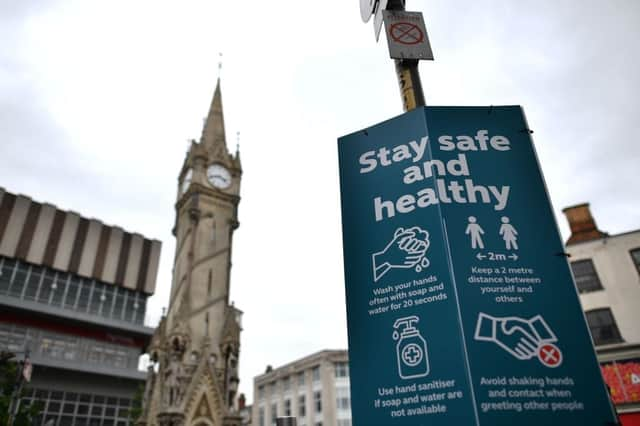Here’s why Leicester is in lockdown - and what measures have been imposed in the city


Tougher lockdown restrictions have been enforced in Leicester following a spike in coronavirus cases.
The strict measures mean the city will not emerge from parts of lockdown as quickly as the rest of England, with the Prime Minister warning similar measures could be extended in other towns and cities over the coming months.
Why is Leicester in lockdown?
Advertisement
Hide AdAdvertisement
Hide AdLeicester has been forced into a harsher lockdown than the rest of the UK due to a recent outbreak of infections, accounting for 10 per cent of all coronavirus cases in the country over the past week.
Health Secretary Matt Hancock said the city’s seven day infection rate was 135 cases per 100,000, amounting to three times that of the next highest city.
The government is yet to confirm exactly which areas will be included in the lockdown, but it is expected the surrounding suburbs including the town of Oadby, and the villages of Birstall and Glenfield would be included.
Harborough, Oadby and Wigston MP Neil O'Brien said on social media that the measures would apply in outer parts of Leicester too, including his constituents in Oadby, Wigston and South Wigston.
Advertisement
Hide AdAdvertisement
Hide AdHowever, he said that Great Glen, a village two miles south of Oadby, was not included.
What measures will be imposed?
To prevent further spread of the virus, from Tuesday (30 June) all non-essential shops will have to close and schools will be closed to pupils from Thursday (2 July).
Schools will only stay open for vulnerable pupils and children of key workers, and people will be permitted to travel for childcare.
All but essential travel to, from and within the city is being discouraged and residents have been told to stay at home wherever possible.
Advertisement
Hide AdAdvertisement
Hide AdExtra facilities have also been set up for walk-in tests, while home testing kits are available.
Leicester City Council said there had been more than 940 confirmed cases of coronavirus in the city in the past two weeks, and that an indoor testing centre would open on Tuesday (30 June) at the Highfields Community Centre, with further testing sites planned.
Mr Hancock has said that anyone who experiences symptoms of coronavirus must come forward for a test.
The lockdown measures will be kept under review and it will be decided if any restrictions can be lifted in two weeks’ time.
How would a local lockdown work?
Advertisement
Hide AdAdvertisement
Hide AdMr Hancock explained that where there are localised “flare-ups”, restrictions or lockdowns could be used in those specific areas in England to contain the virus spread.
He said that the Joint Biosecurity Centre, which advised the government on the Covid alert level, would work in partnership with local directors of public health and NHS teams to address the issue of a local outbreak, and ensure the right action was taken.
However, depending on the severity of the outbreak, a local lockdown may focus solely on the location where it occurred, such as a care home, or workplace, or it would extend to a wider area.
If the latter is imposed, lockdown could extend to a postcode, town or a whole city, if it was considered necessary. However, local councils do not currently have the power to enforce a lockdown on a whole area, such as a town or city.